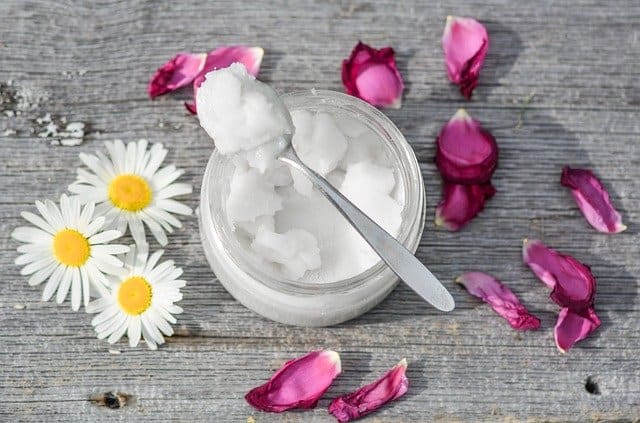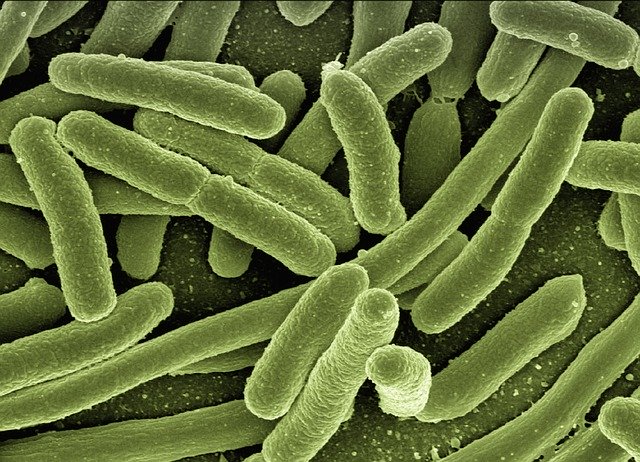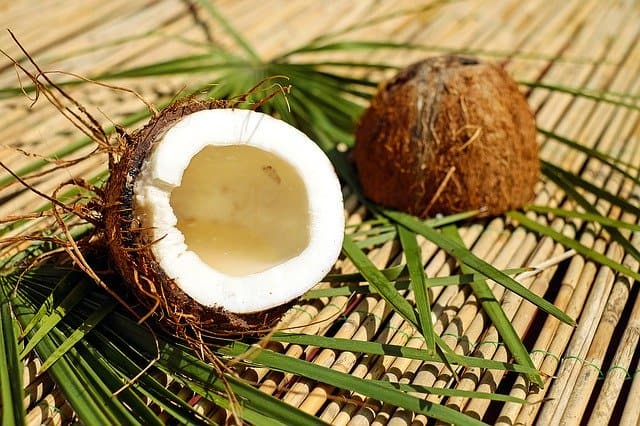Coconut oil has many health benefits, but in this article, we are focusing on the impact that coconut oil has on hair growth.
This amazing oil has been used for various health and beauty reasons throughout history, especially in Asia, where the fruit is abundant. Typically the flesh of the coconut is pressed in multiple different ways to extract the oil. Once the producers harvest the oil, it can be consumed as a food or used topically.
Contents
3 Ways Coconut Oil Could Help Hair Grow Faster
 Back in 2003, scientists were able to minimize damage from combing by topically applying coconut oil to the scalp. Since coconut oil is a straight-chain fatty acid, it can penetrate the hair shaft and reduce protein decay.(1) These medium-chain triglycerides can also assist in blocking DHT. If you want to know more, check out our full list of DHT blocking foods.
Back in 2003, scientists were able to minimize damage from combing by topically applying coconut oil to the scalp. Since coconut oil is a straight-chain fatty acid, it can penetrate the hair shaft and reduce protein decay.(1) These medium-chain triglycerides can also assist in blocking DHT. If you want to know more, check out our full list of DHT blocking foods.
Since then, many people have become aware of its ability to regrow hair naturally. You can find it in many hair products and even in the best hair growth shampoos.
Below, we will look at some other reasons why it could be useful.
1. Vitamins and Fatty Acids
Although coconut oil does not contain a large number of vitamins, it does contain two things that are especially helpful.
First off, coconut oil contains Vitamin E. Vitamin E is a powerful antioxidant that helps to protect the skin against inflammation and signs of aging. In the case of the scalp, it is particularly useful in keeping hair follicles healthy. For that reason, it is one of the best vitamins for hair growth.
In one study on human patients, researchers noticed that hair counts increased after using tocotrienols, which are in the Vitamin E family, for eight months. Scientists believe that the antioxidant effects of E helped in reducing scalp stress, which helped hair regrow. (2)
Secondly, coconut oil also contains lauric acid, which is a medium-chain fatty acid. Another substance that is high in lauric acid is breast milk, which is essential to newborns. It is both an antifungal and an antibacterial, which leads us to our next topic.
2. Antibacterial
 As we mentioned above, lauric acid is antimicrobial. That means that it can help kill harmful bacteria.
As we mentioned above, lauric acid is antimicrobial. That means that it can help kill harmful bacteria.
In a study on oil pulling, researchers found that swishing coconut oil in between your teeth helped to reduce the amount of Streptococcus mutans bacteria in the mouth. After 30 days, they noticed that is was as effective as chlorhexidine. (4)
That is particularly relevant because scientists noticed that patients with Androgenetic Alopecia had an overgrowth of bacteria in certain parts of the hair follicle. After time, the hair follicle goes through a miniaturization process and eventually stops producing hair. (5) By reversing this cycle, it could be possible to regrow hair.
3. Antifungal
In lab studies, researchers found coconut oil to be a powerful antifungal. (3) Although the studies demonstrated the effectiveness of using it internally to treat fungal overgrowth in the stomach, people hypothesize that it works on the skin as well.
The reasoning behind this is that it is effective at treating the candida family of fungus. These are the same types of fungus that also create infections on the skin.
Fungal infections of the scalp lead to itching and flaking. These scalp conditions can lead to injury to the hair follicle and chronic itching, which can lead to hair loss. By effectively treating the fungal infection, you can increase hair count .
How To Use Coconut Oil For Maximum Growth
 The best way to use coconut oil is to apply it topically to your scalp before or after washing your hair.
The best way to use coconut oil is to apply it topically to your scalp before or after washing your hair.
First, take a small amount of coconut oil and melt it in your hands. If you want to increase the effectiveness of the coconut oil, you can mix in a few drops of your favorite essential oil. We use several essential oils for promoting hair growth.
Finally, using your fingertips gently massage it into your scalp. If you want to moisturize and protect the hair itself, you could coat the individual strands of hair with coconut oil as well.
What is the Best Coconut Oil To Use
The highest quality coconut oil to use is one that is organic and cold-pressed.
Cold-pressed means that it is pressed from the coconut without heat. Heating oils is another step in the refinement process that could destroy some of the nutritional value.
Also, it is important to use coconut oil that is free from pesticides. Pesticides disrupt the hormone and endocrine systems. To maintain healthy hair, we want to make sure that our hormones are working properly.
Finally, try to use coconut oil that comes in a glass jar. Through time, and especially when exposed to various temperatures, plastic gradually breaks down. When the plastic breaks down, harmful chemicals leach into the coconut oil, which can hurt your health.
Conclusion
Although more studies need to be done on coconut oil and hair development on human patients, some evidence exists that suggests that it may be helpful. Since coconut oil contains the MCT lauric acid and Vitamin E, it has various benefits to the hair follicle and scalp health.
Aside from directly helping hair to grow, it also may help in secondary measures. Coconut oil also may help protect the hair from sun damage and also can keep dry hair moisturized. Both of these may result in less hair breakage, which would make a fuller appearance and have hair grow faster.
When using coconut oil to try and regrow hair, it is probably a good idea to use it in combination with other therapies.
References:
(1) Effect of mineral oil, sunflower oil, and coconut oil on prevention of hair damage. Rele AS, Mohile RB. J Cosmet Sci. 2003 Mar-Apr;54(2):175-92.
(2) Effects of Tocotrienol Supplementation on Hair Growth in Human Volunteers. Lim Ai Beoy, Wong Jia Woei, and Yuen Kah Hay. Trop Life Sci Res. 2010 Dec; 21(2): 91–99.
(3) In vitro antimicrobial properties of coconut oil on Candida species in Ibadan, Nigeria. J Med Food. 2007. Department of Medical Microbiology & Parasitology, University College Hospital, Ibadan, Nigeria. Jun;10(2):384-7
(4) Comparison of antibacterial efficacy of coconut oil and chlorhexidine on Streptococcus mutans: An in vivo study. J Int Soc Prev Community Dent. 2016 Sep-Oct; 6(5): 447–452.
(5) Microbiome in the hair follicle of androgenetic alopecia patients. PLoS One. 2019; 14(5): e0216330.
